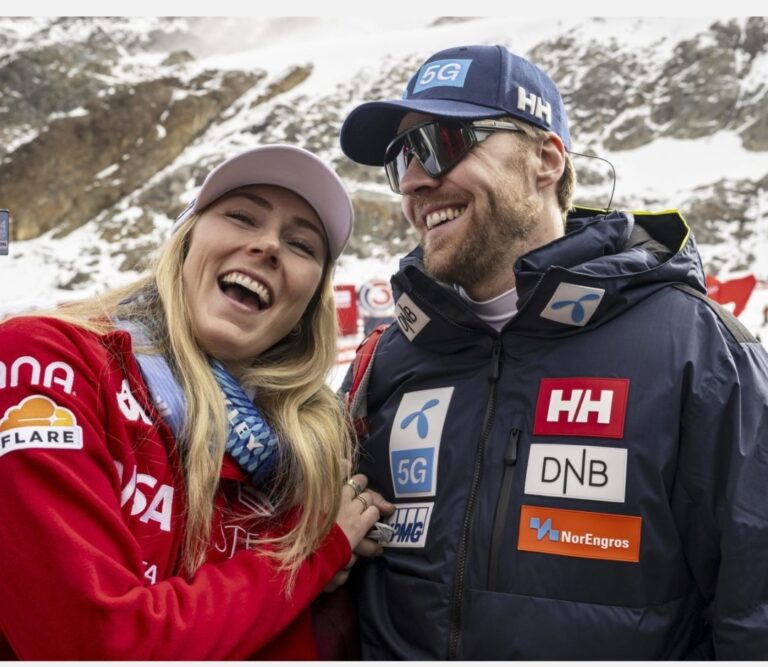Mikaela Shiffrin kicked off the 2025-26 FIS Alpine Ski World Cup season with a commanding performance, securing fourth place in the women’s giant slalom opener on Saturday amid a dominant showing by the U.S. Ski Team. Just off the podium in a discipline that has tested her resolve, the 30-year-old American star followed her effort with a romantic social media nod to her fiancé, Norwegian alpine ace Aleksander Aamodt Kilde, evoking their signature “It takes two to tango” sentiment that has endeared them to fans worldwide.
The Rettenbach glacier course delivered crisp autumn conditions under a record crowd of 15,900, as Austria’s Julia Scheib claimed a breakthrough victory—her first World Cup win—edging out U.S. teammate Paula Moltzan by 0.23 seconds for second place. Switzerland’s Lara Gut-Behrami rounded out the podium in third, 0.45 seconds behind Scheib. Shiffrin, starting 20th due to a 16th-place finish in last season’s giant slalom standings after an injury-plagued campaign, posted the sixth-fastest time in the opening run before charging to the seventh-quickest second run, climbing two spots to narrowly miss bronze.
It marked Shiffrin’s best giant slalom result since January 2024 and her strongest early-season performance in the event in recent memory. Coming off a frightening crash in Killington, Vermont, last November that left her with an abdominal puncture and battles with post-traumatic stress disorder (PTSD), Shiffrin entered the season with cautious optimism. She skipped the giant slalom at the 2025 World Championships in Saalbach, Austria, to focus on recovery, but her Sölden showing signaled a return to form.
“I’m super happy,” Shiffrin said post-race, her voice laced with relief and excitement. “After how last season ended and the waiting game this summer, I just wanted to feel connected again—mind, body, and race nerves all in sync. Today felt like that. I was so nervous all week, but once I got in the start, everything clicked.” The result not only boosted her confidence but also highlighted the depth of the U.S. women’s team: Six Americans cracked the top 20, with Nina O’Brien tying her career-best sixth and Katie Hensien in 12th.
Shiffrin’s day extended beyond the course into the heartwarming realm of her personal life. Hours after the race, she turned to Instagram to share a carousel of photos featuring Kilde—captured courtside during a recent basketball outing, mid-laugh in casual off-snow attire, and in a tender embrace from their shared training sessions. The caption read: “It takes two to tango—even when the course is icy and the nerves are real. Grateful for my partner in every run.
Kilde, sidelined for the entire 2024-25 season following a high-speed crash in Wengen, Switzerland, in January that required multiple shoulder surgeries, responded in the comments with a simple yet poignant: “Proud of you always. Tango on, Queen..” The exchange, echoing their emotional post from earlier in the year after Shiffrin’s 100th World Cup victory, quickly amassed over 200,000 likes and flooded with heart emojis from fans and peers alike. Teammate Moltzan chimed in: “You two are goals! Congrats on the epic day.”
The couple’s bond, forged in 2022 amid grueling training regimens in Colorado and Norway, has been a beacon of resilience. Engaged since April 2024, Shiffrin and Kilde— a two-time Olympic medalist and 2020 overall World Cup champion with 21 wins—have navigated parallel injury recoveries with mutual encouragement. In a pre-race press conference, Shiffrin opened up about Kilde’s progress: “He’s doing incredibly well, but it’s a long road. He has limitations in his shoulder that he might have for the rest of his life. Racing is as much a return to life for him as it is for me.” Kilde, eyeing a comeback in the men’s opener next weekend, has shared glimpses of his rehab on social media, including a recent post from South American training: “Back on the slopes—100 days to Beaver Creek.”
Their story resonates as the World Cup embarks on an Olympic-qualifying year, with Shiffrin now holding 101 career victories—extending her record as the most successful athlete in the tour’s history. Off the slopes, she continues her advocacy through the Mikaela Shiffrin Foundation, announcing a $5,000 donation to PTSD support programs in light of her own experiences. “These moments remind me why we push through,” she reflected. “The wins, the support—it’s all connected.”
With the circuit shifting to Levi, Finland, for slalom next month, Shiffrin and Kilde’s synchronized journey promises more chapters of grit and grace. In a sport of individual feats, their duet reminds us: the steepest descents are conquered together.
